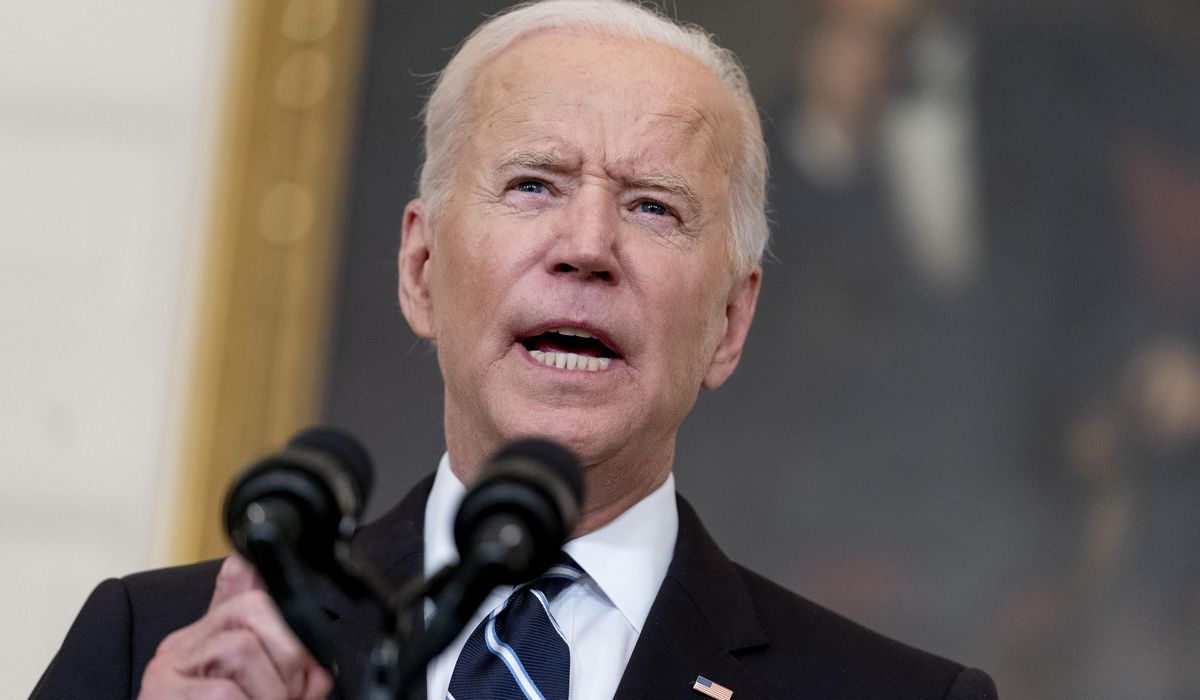
The percentage of Americans fully vaccinated against COVID-19 quietly passed the 50% mark in early August, a milestone overshadowed by Senate wrangling over an infrastructure bill, a House probe into the Jan. 6 attack on the U.S. Capitol and the Taliban’s march through Afghan provinces.
A month later President Biden, battered by lousy jobs reports and a disastrous exit from Kabul, is hammering the “minority” of Americans who remain unvaccinated and jumping headlong into the thorny world of mandate politics. Leaning heavily on us-versus-them rhetoric, he’s betting voters will take his side as he tempts backlash and lawsuits over his sweeping mandates on private employers.
“Have at it,” Mr. Biden said in a taunt Friday to Republicans who threatened to sue over the forthcoming rules from the Occupational Safety and Health Administration.
The president referred to unvaccinated Americans as a minority three times in a White House speech detailing the mandates, which also impact federal employees and health workers.
“We have the tools to combat COVID-19, and a distinct minority of Americans — supported by a distinct minority of elected officials — are keeping us from turning the corner,” he said, alluding to GOP governors who’ve tried to block mask requirements and vaccine mandates “These pandemic politics, as I refer to [them], are making people sick, causing unvaccinated people to die.”
It’s unclear if the gambit will work.
Many holdouts say it’s not political. They are simply worried about the unknown, given the novelty of the technology and how quickly it was adapted into a COVID-19 vaccine.
Fear of severe side effects is the number-one reason given to pollsters tracking hesitancy. Many in the “wait and see” group say they just want more time to see how the shots affect people, according to the Kaiser Family Foundation.
Legal experts say forthcoming OSHA rules, which apply to companies with 100 or more employees, will give cover to employers who wanted to require the shots but feared an employee revolt. And they say OSHA has a long record of requiring better work conditions, even if blocking a coronavirus is more intrusive than installing better air filters in office buildings or putting earmuffs on assembly line workers.
Yet Mr. Biden is courting a fierce backlash from GOP governors and conservatives who say the sweeping mandates are legally questionable, along with labor unions who are politically aligned with the White House but say they must have a say in writing the new rules.
Others see a brazen attempt to pivot away from the disastrous military exit from Afghanistan to pressing domestic issues — in other words, an attempt to deploy “pandemic politics” from another direction.
“The move has a whiff of desperation about it but it is a distraction from the chaotic collapse of the Afghan government and how the White House was caught flat-footed. It raises the interesting question of whether one failure can be used as political cover for another,” said Ross Baker, a politics professor at Rutgers University.
Even if Mr. Biden is successful, it will take time for the mandates to have a scientific impact on the incidence of disease or infection. A full course of the Pfizer-BioNTech vaccine or Moderna vaccine takes three or four weeks, respectively, and a person isn’t considered fully protected until two weeks after the second dose.
Regardless, Mr. Biden said the U.S. is better prepared this year for a potential winter spike given the current extent of vaccination. But a steady stream of headlines about overflowing hospitals in poorly vaccinated areas across the South are making the administration and everyday Americans skittish about what lies ahead — and sparking a calculated risk from the president, who thinks tougher rules are needed.
The Pfizer vaccine is the only version fully approved by the Food and Drug Administration.
The Moderna and one-shot Johnson and Johnson vaccines are being deployed under an emergency-use standard and haven’t received a biologics license.
Mr. Biden did not say which version employees should get but used the Pfizer approval as ammo for his push, arguing holdouts should feel more comfortable.
“Many said they were waiting for approval from the Food and Drug Administration — the FDA. Well, last month, the FDA granted that approval. So, the time for waiting is over,” he said.
Pfizer approval might be a factor in how employers try to enforce the rules.
“I think so long as there is one FDA-approved vax, employers can say, ‘Get that one!’” Josh Blackman, a professor at the South Texas College of Law, said in an email.
Still, the vaccine push might go beyond the statutory authority Congress granted OSHA since receiving an injection is conduct that extends beyond the workplace.
“There are going to be thousands of suits. Some court somewhere will stop it,” Mr. Blackman said.
Mr. Biden’s position is a turnabout from 2020 campaign rhetoric in which he rejected the idea of vaccine mandates when asked if he’d impose them. Instead, he suggested managing COVID-19 vaccines the way the measles vaccine is handled. There is no federal measles vaccine mandate but most states require a child to get the shot before they attend school.
“You can’t say everyone has to do this,” Mr. Biden said at a Philadelphia town hall in October, adding that he would encourage state and local leaders to decide if mandates were necessary.
After he won the election, Mr. Biden reiterated that it would be not necessary to mandate a coronavirus vaccine.
“I don’t think it should be mandatory. I wouldn’t demand it to be mandatory,” he said at a news conference in Wilmington, Delaware. “Just like I don’t think masks have to be made mandatory nationwide.”
Republicans were quick to highlight the pivot.
“Biden told the American public he would not mandate the vaccination. He lied. This overreach is a step into the dystopian future where government bulldozes constitutional rights,” said Rep. Nicole Malliotakis, New York Republican.
Mr. Baker said the move is a retreat from his previously stated position but incentives “seem to have produced only modest increases, so Biden was left with few options in the face of grim local outbreaks.”
Some pro-vaccine Republicans say the president is misreading the politics. They worry the new rules will be self-defeating.
“Private businesses have the legal authority to impose vaccine mandates on their customers and or employees if they see fit,” Sen. Pat Toomey, Pennsylvania Republican, said. “But federal government mandates, of dubious legality, will further alienate the skeptical, undermine our institutions, and punish ordinary business owners and their employees.”
Scientists say up to 90% of the population might need to be vaccinated to stem the fast-moving delta variant.
Mr. Biden noted that nearly 75% of those aged 12 and older, who are eligible for the shots, have received at least one dose, characterizing it as an influential majority — though not sizable enough to wrangle the virus.
“The vast majority of Americans are doing the right thing. Nearly three-quarters of the eligible have gotten at least one shot, but one quarter has not gotten any. That’s nearly 80 million Americans not vaccinated,” Mr. Biden said. “And in a country as large as ours, that’s 25 percent minority. That 25 percent can cause a lot of damage — and they are.”




